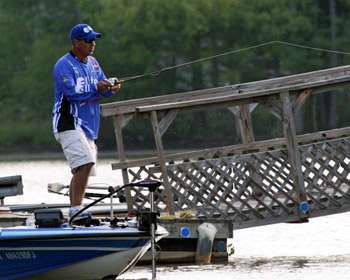
It's often been said that history is the best predictor of the future. Perhaps it's for that reason alone that if an angler finds a hot spot on a lake that they visit only rarely, on each return trip it's likely that they'll attempt to repeat their past glory on that same spot. Then again, it could be that it's simply human nature — if it worked once, surely it will work again.
According to Elite Series pro Scott Rook, "fishing in the past" can be useful at times, but it should never be assumed that it's a guarantee from one visit to the next. "We go to many of the same lakes every season, and usually around the same general time of the year," the Arkansas pro points out. "Normally, the first day of practice I'll go and check spots where I've done well in the past just to get it out of my head." Rook explains that the only guarantee from prior "hot spots" is that if they're not checked during practice they will certainly haunt him throughout the event.
"I don't want to be second-guessing myself once the tournament starts," he says. "A lot of times those spots aren't still good, but at the very least it can't hurt you to check them just to be sure." While a handful of lakes the Elite Series visits each year will hold fish on or around the same spots time and again, there are just as many that seem to change as quickly and as often as the weather. "When you go to a grass lake, for example, you can take whatever you did the year before and throw it right out the window," Rook explains.
"The grass will be different every single time you go there — Toho and Kissimmee are prime examples of that. Still, I'll always go look at old spots the very first morning of practice just to get it out of the way and be absolutely certain." Fishing from past experience is, to a large degree, unavoidable. After all, experience is how you learn. But Rook insists that 90 percent of the time history will let you down in the end. "I try not to gravitate towards fishing history," he says.
"I tend to always try and fish patterns instead. Even if I find some fish on a spot I've located in the past, I'll want to work a pattern instead of trying to catch them the same way that I have before." The only exception, Rook points out, is if he's on a lake — such as Kentucky or Clarks Hill — where "hole fishing" is the dominant method.
He adds that even with limited experience on an unfamiliar lake, looking at the seasonal movements of bass is the best way to start any fishing trip. "On lakes that you only fish once a year, it's impossible to know for sure where they're going to be from one visit to the next," he says. "You have to know and understand the seasonal movements of bass in general and then try to refine a pattern from there." The absence of an adequate understanding of seasonal fish movement can ruin an otherwise promising day on an unfamiliar lake.
"Unless you have a basic understanding where they should be during that particular time of the year, you're wasting a lot of time," Rook explains. "Over the course of my career, I've fished most all of the lakes we'll ever visit at least once. I always look at what the season was that I was there last, and then I'll hit spots that I've fished before as a way to eliminate unproductive water."
Eliminating unproductive water, as Rook points out, is the basis for his return to past hot spots to begin with. "The last thing you want to be doing when you're in a tournament, or just out fishing for fun, is wondering if they're biting somewhere else," he says.
"If you don't at least fish the old spots during practice to determine if they're productive or not, you're always going to be thinking to yourself that they'll be biting there instead of trying to refine a pattern in the productive areas that you've found."
(Provided by Z3 Media)




